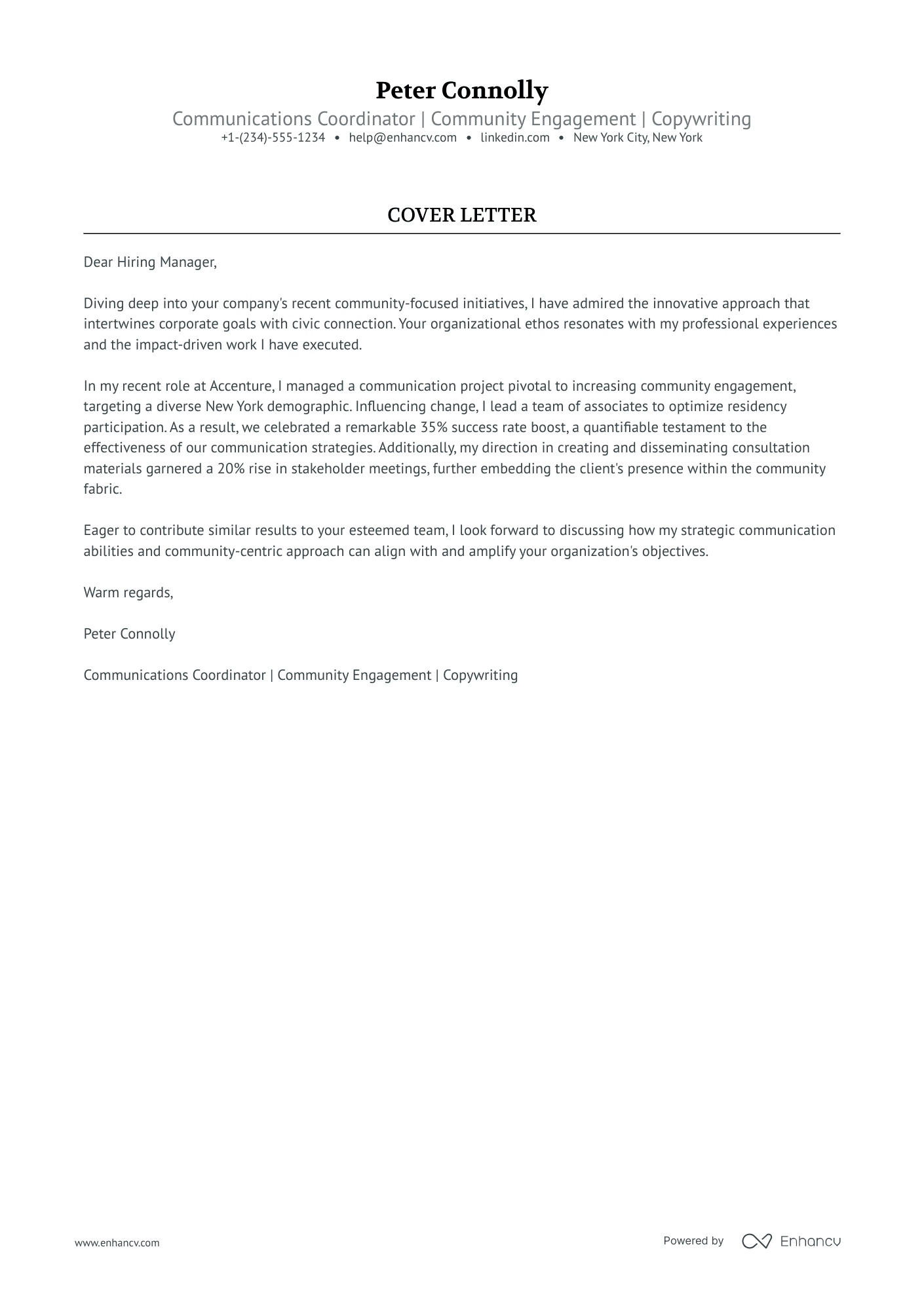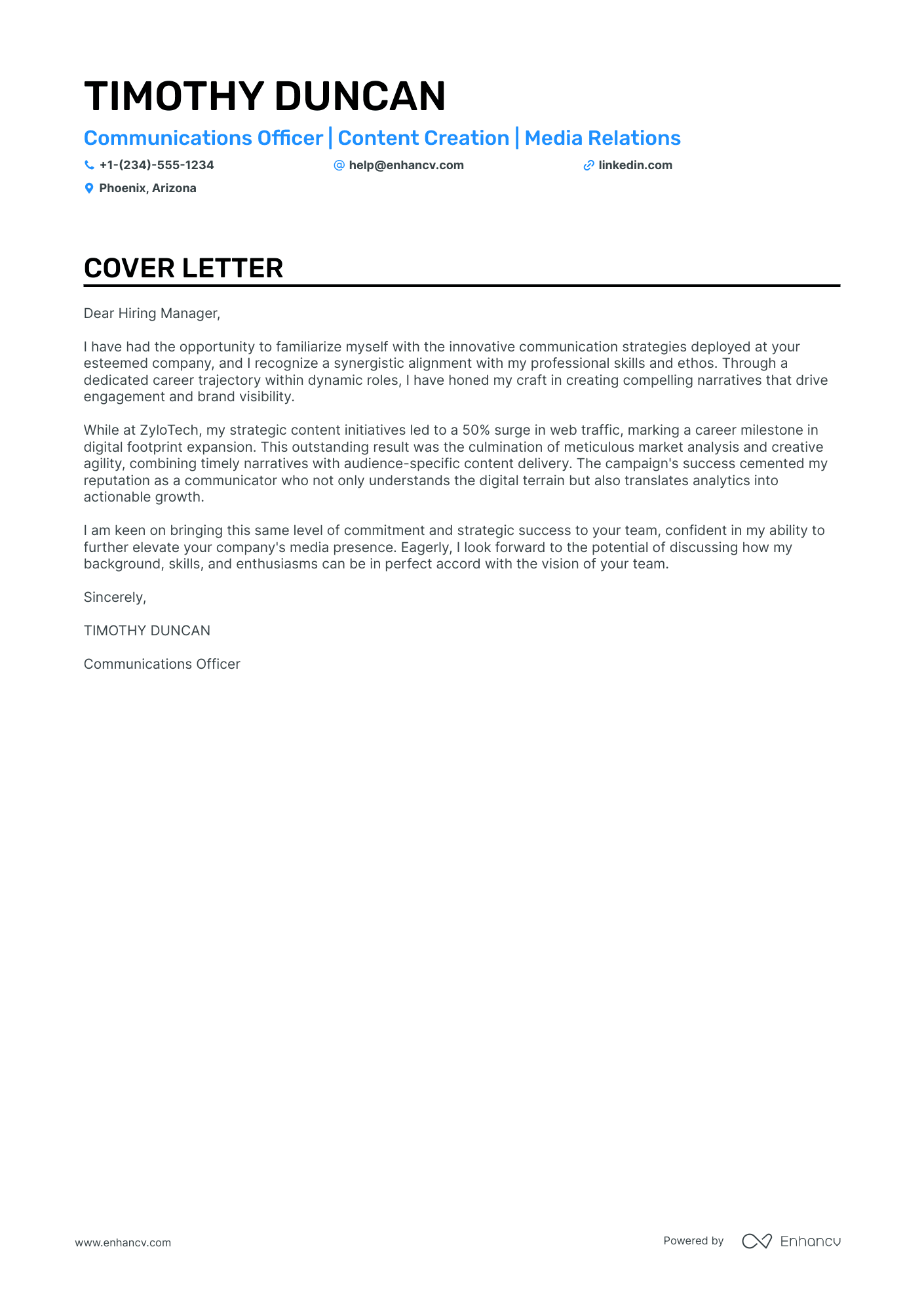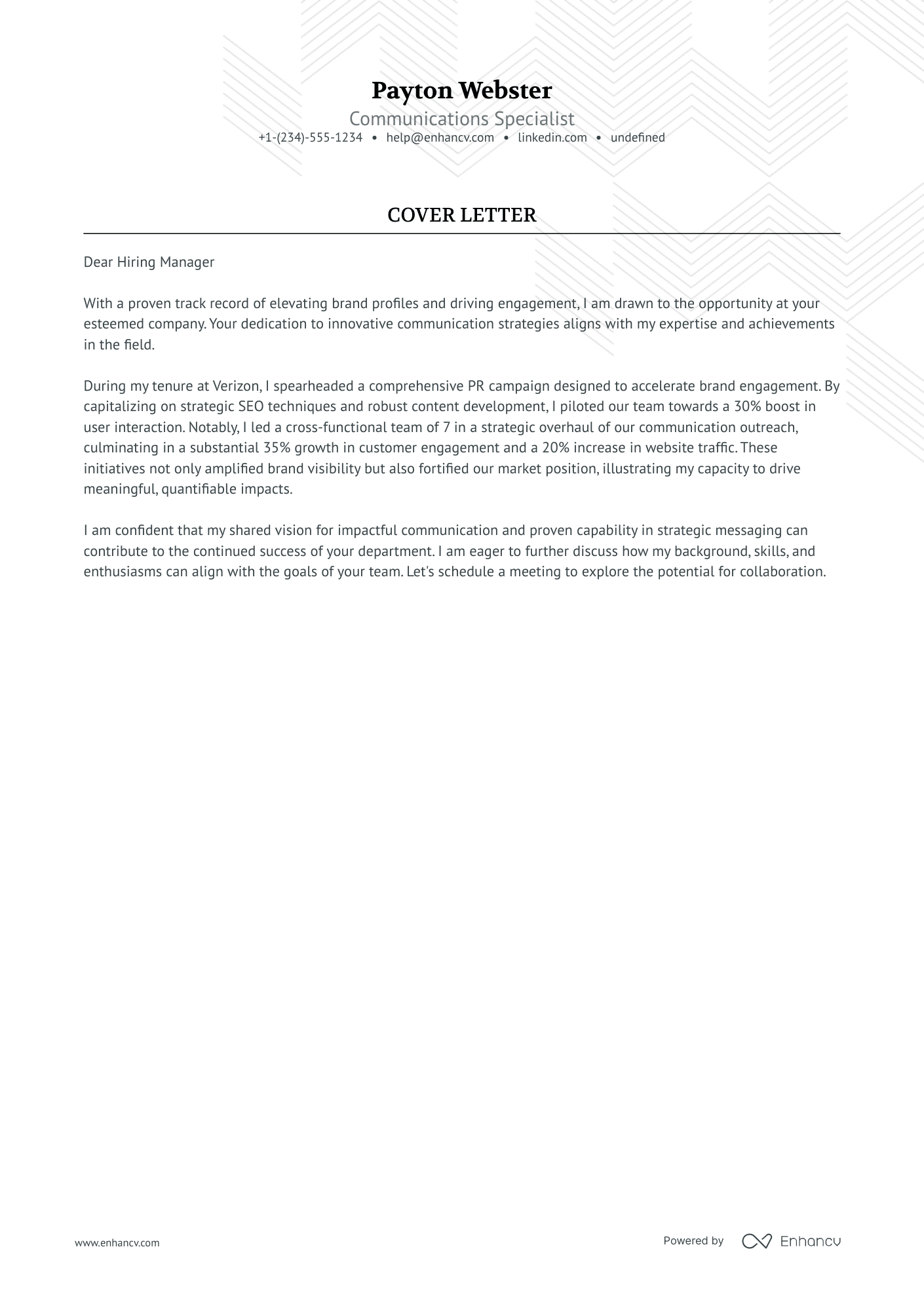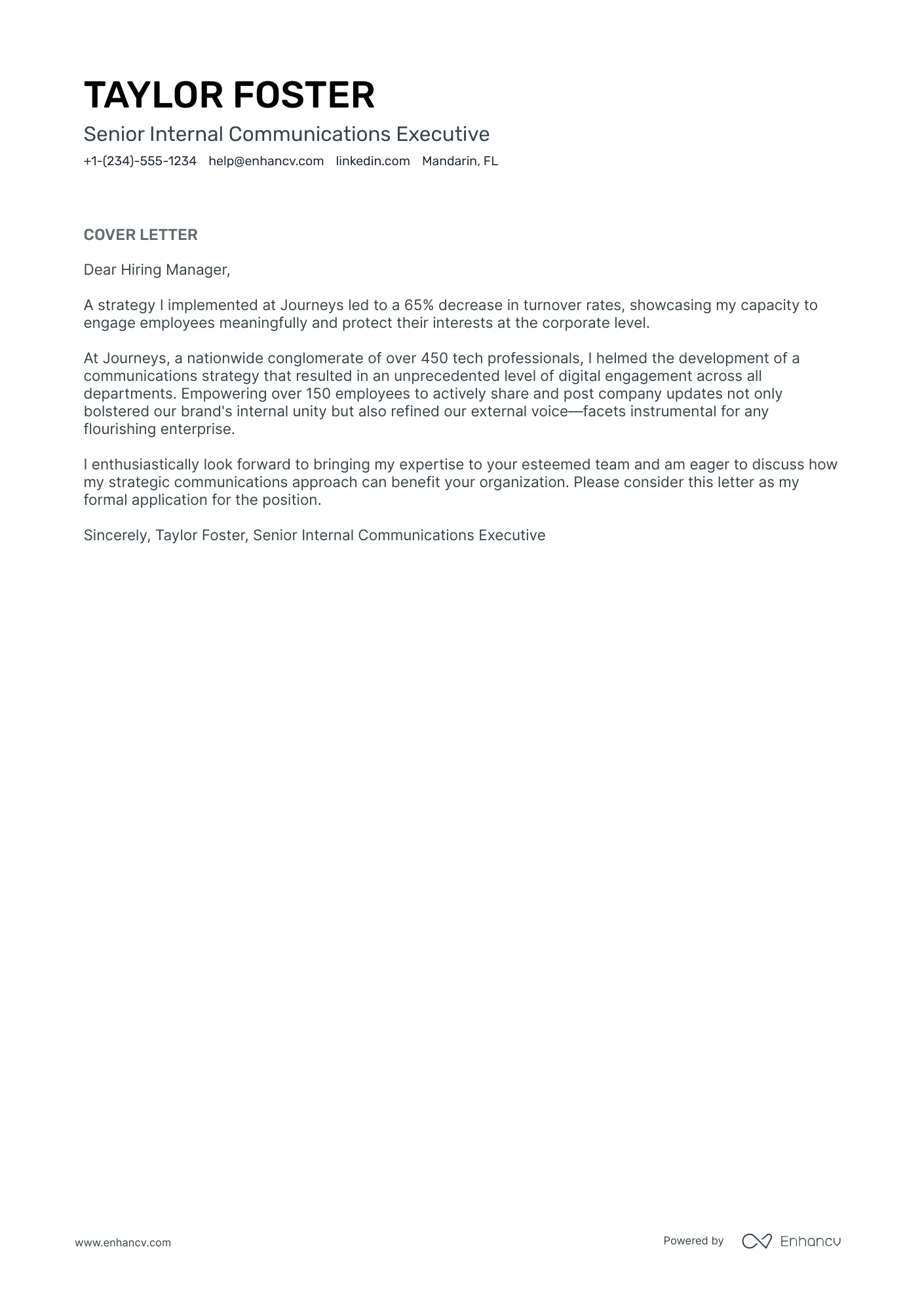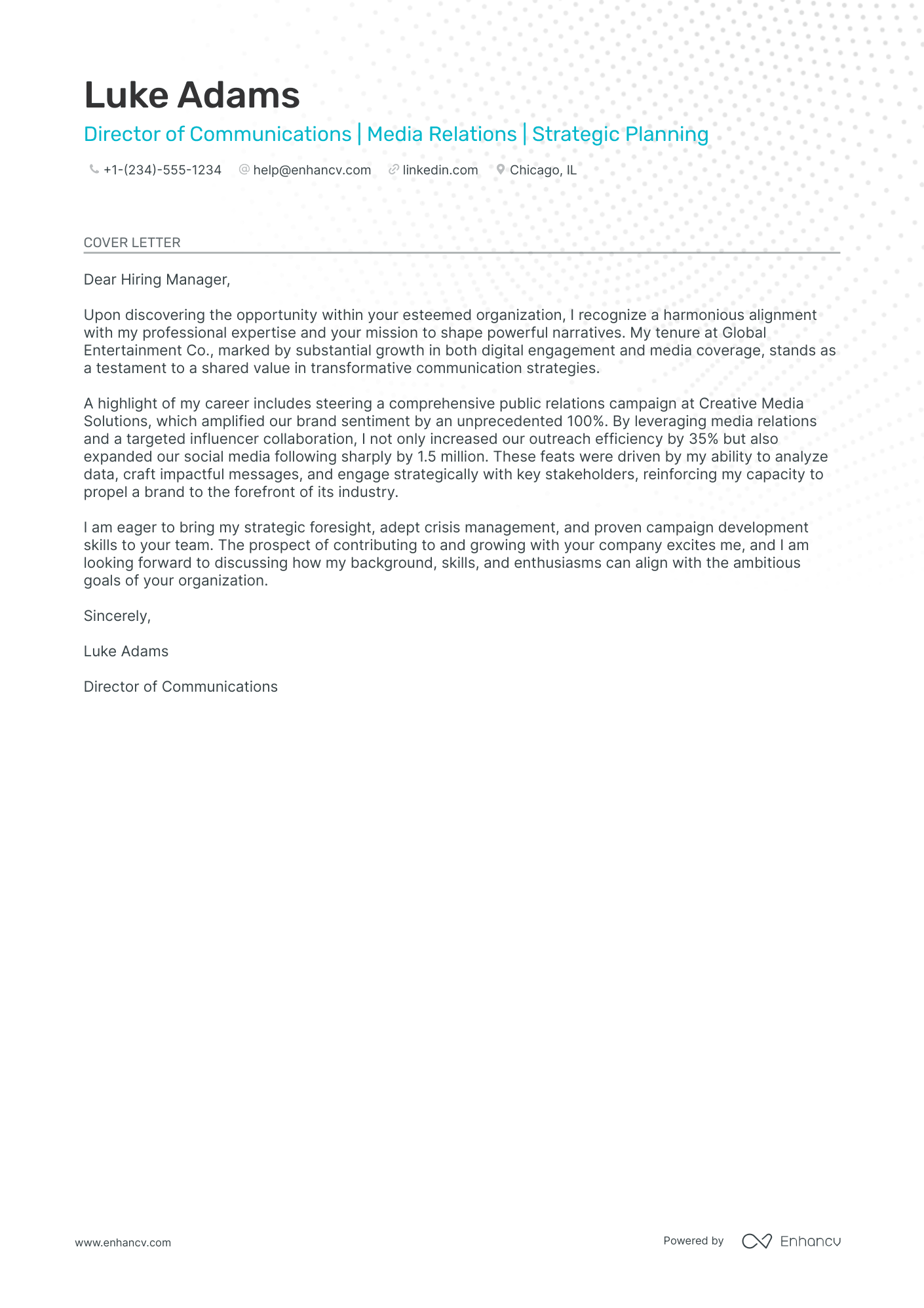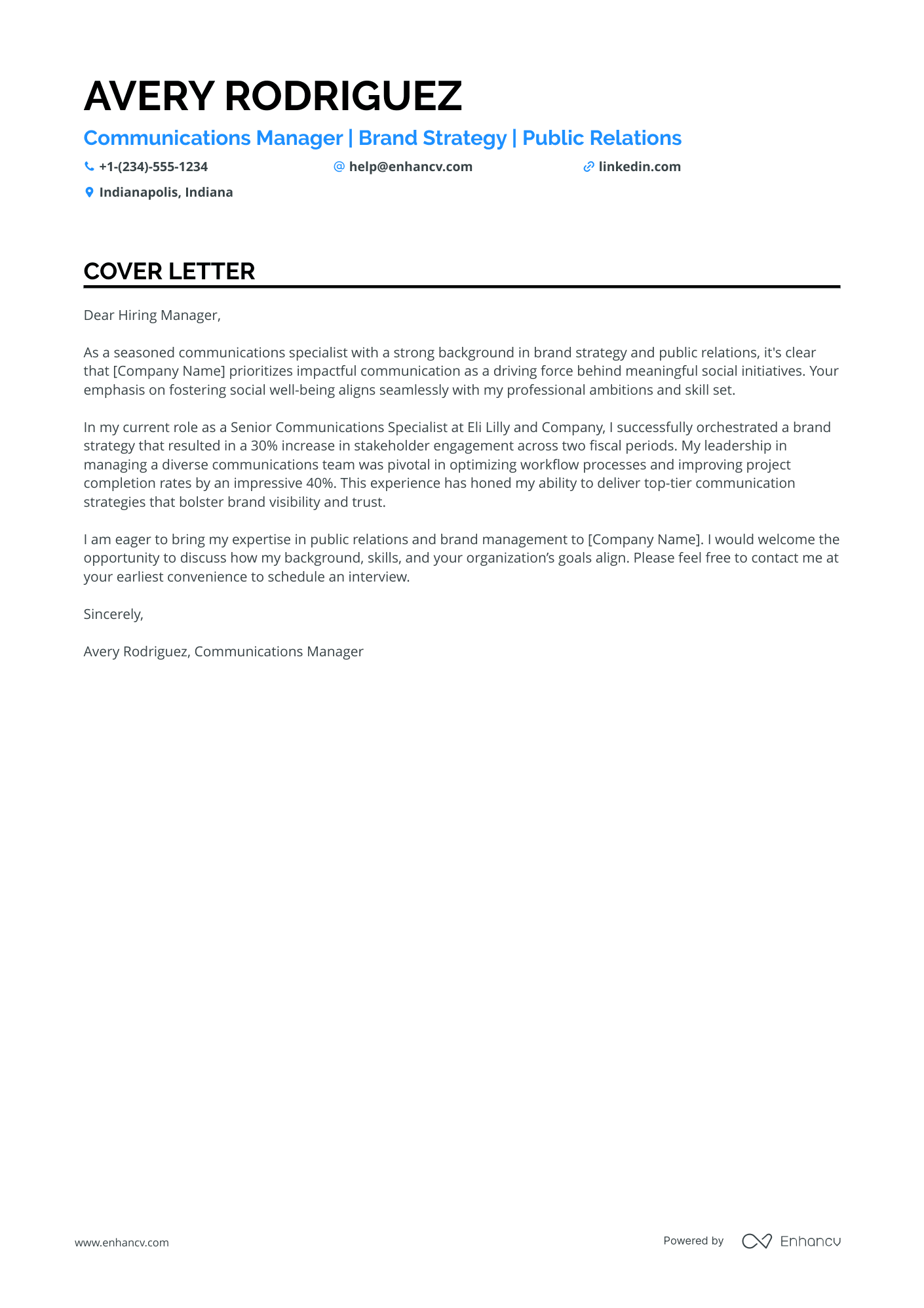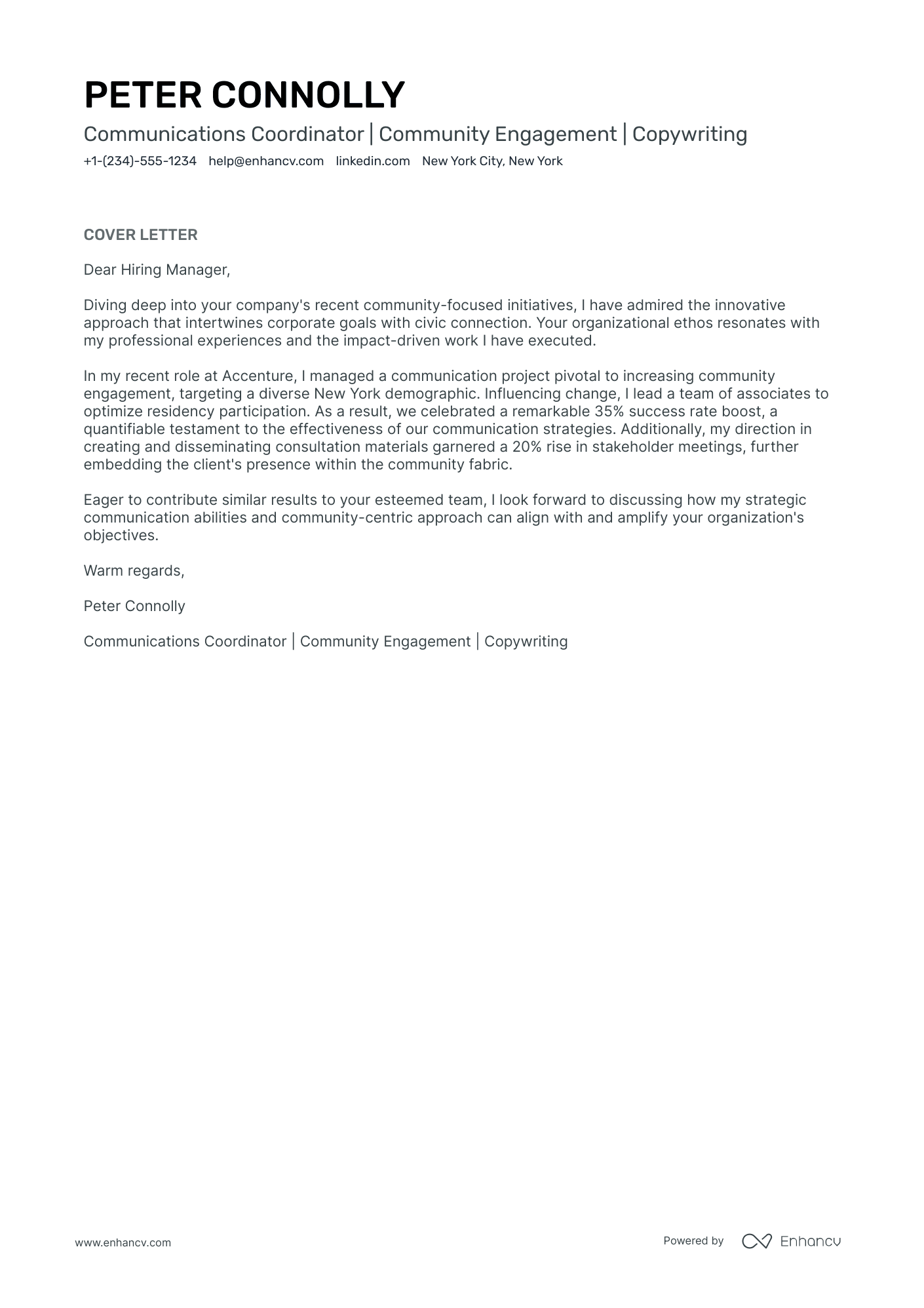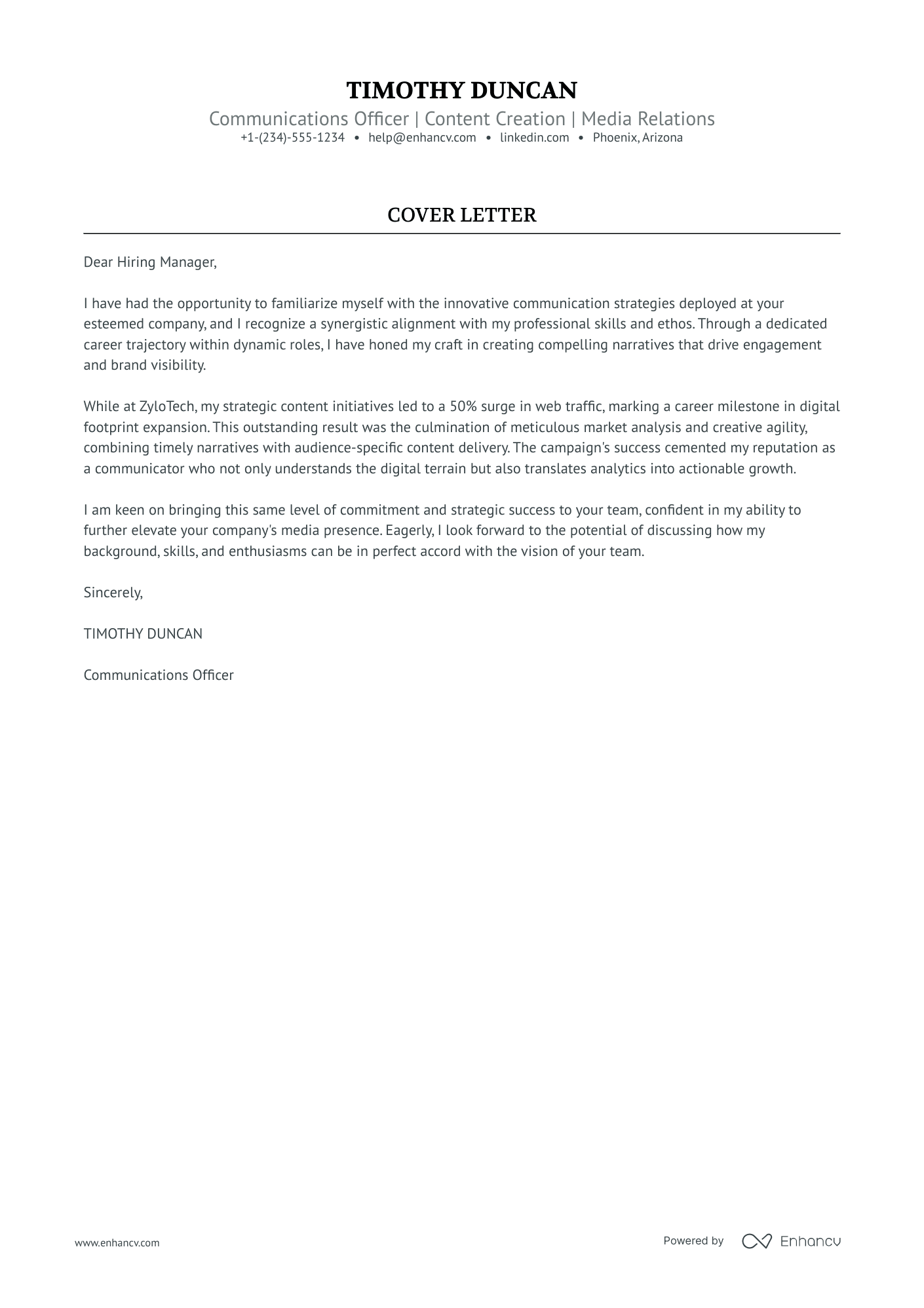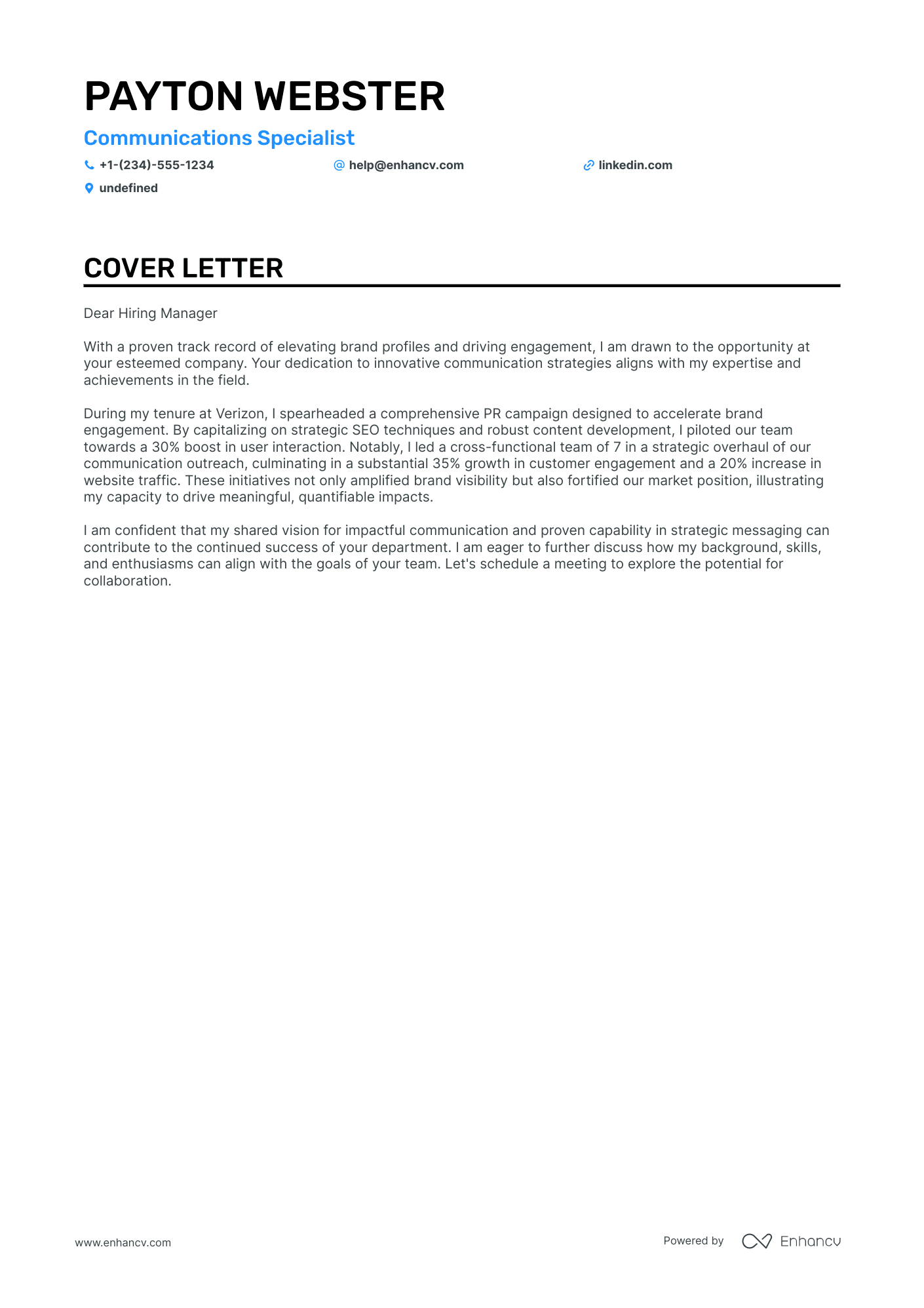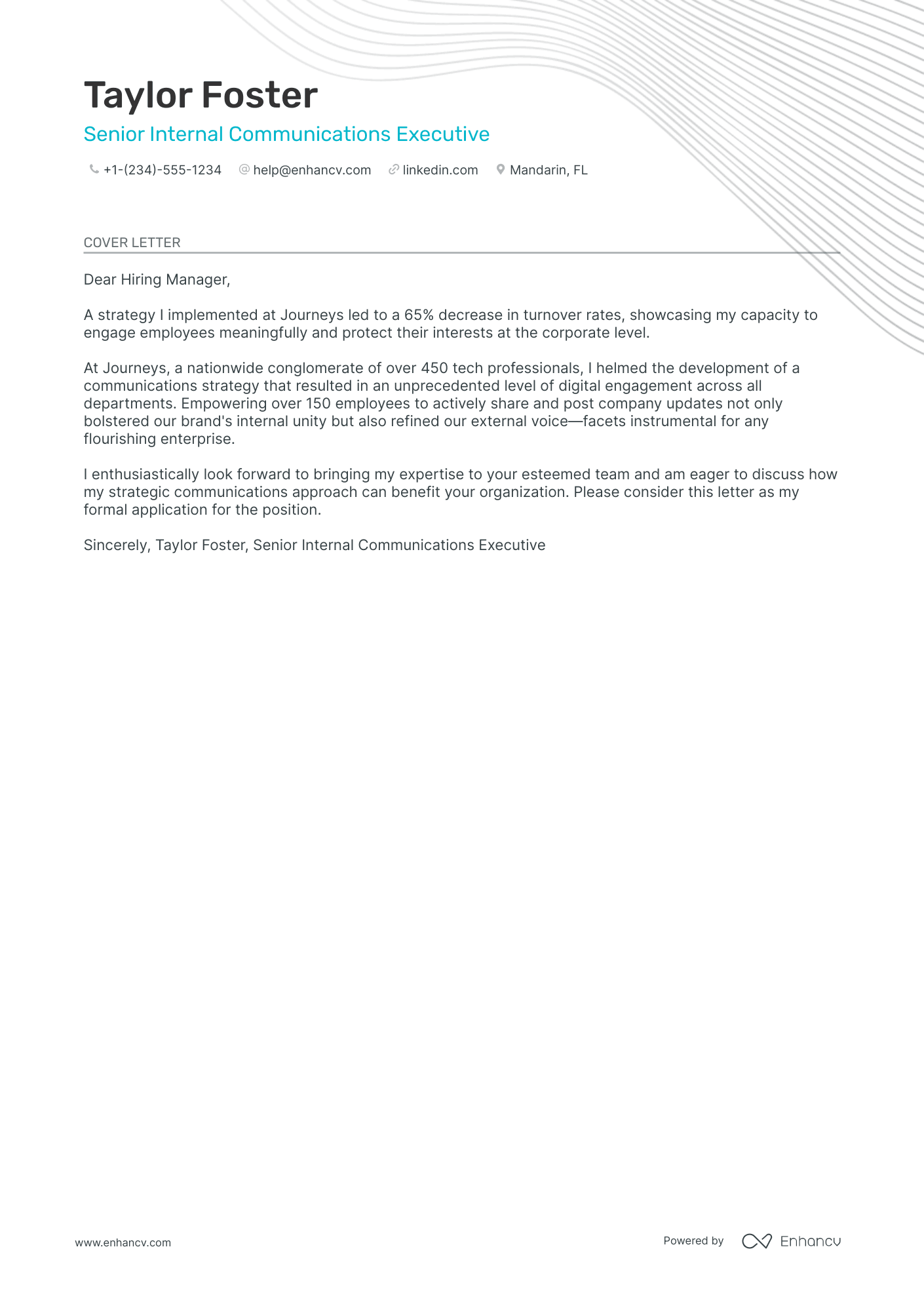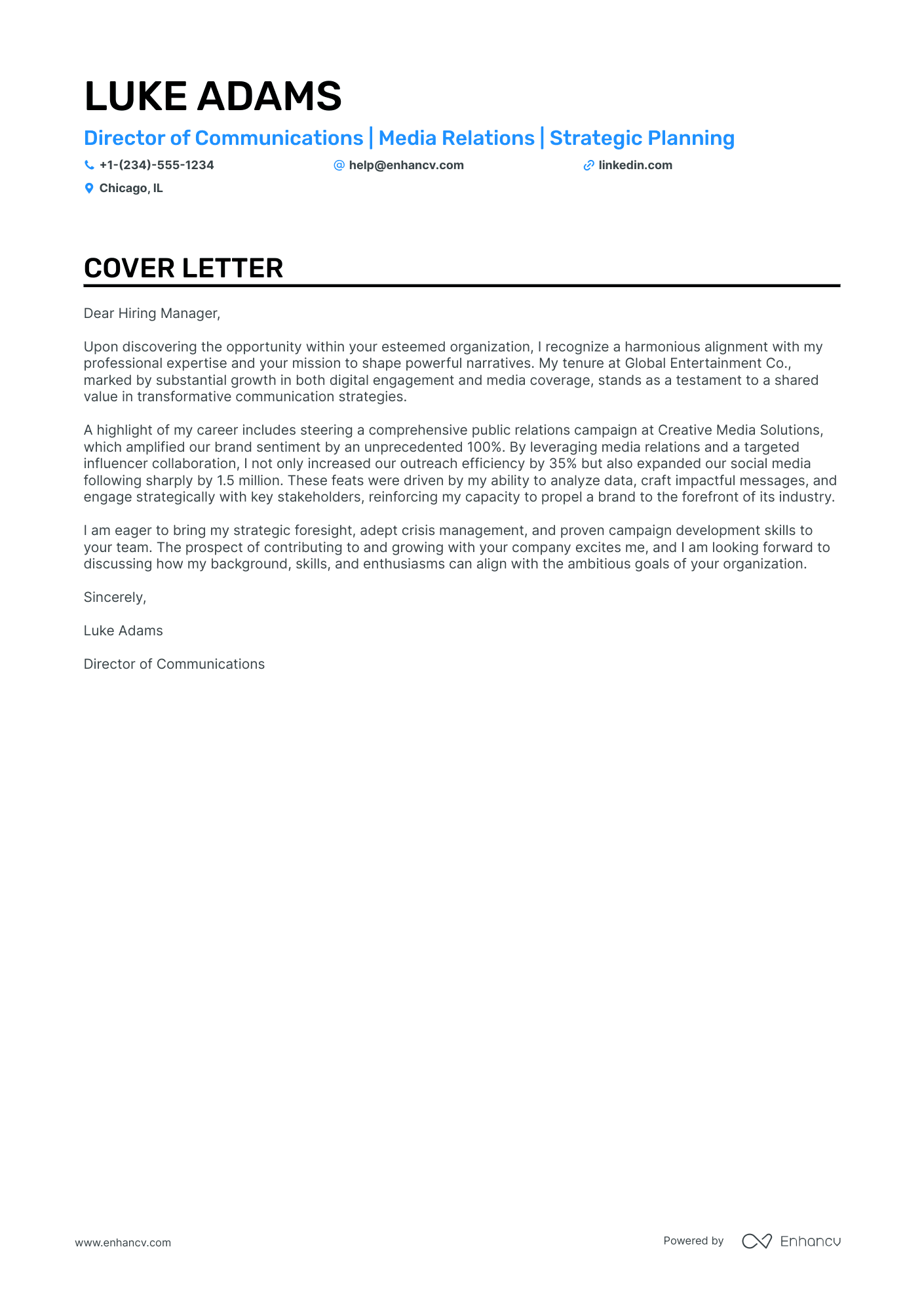Crafting a communication manager cover letter can be a daunting task, especially after you've already dived into the job application process, only to realize it's a required step. Your cover letter is your chance to narrate your proudest professional moment without echoing your resume. Striking the right balance between formality and authentic storytelling, while steering clear of clichés and keeping it to one page, might seem challenging. Let's simplify the process together.
- Write a communication manager cover letter that helps you stand out (and get the job);
- Understand how to start and end your communication manager cover letter with the appropriate greeting;
- What to include in the body of your communication manager cover letter to put your best foot forward;
- Your most important achievements - how to present them as part of your communication manager cover letter.
And if you want to make your life even easier, simply drag and drop your communication manager resume into Enhancv's AI cover letter generator, and it will write your cover letter for you in just a few moments.
If the communication manager isn't exactly the one you're looking for we have a plethora of cover letter examples for jobs like this one:
- Communication Manager resume guide and example
- SEO Manager cover letter example
- Growth Marketing cover letter example
- Communications Officer cover letter example
- Marketing Specialist cover letter example
- Influencer Marketing cover letter example
- Copywriter cover letter example
- Social Media Influencer cover letter example
- Internal Communications cover letter example
- SEO cover letter example
- Media Manager cover letter example
Drop your resume here or choose a file.
PDF & DOCX only. Max 2MB file size.
Communication manager cover letter example
Lucas Rodriguez
New York City, New York
+1-(234)-555-1234
help@enhancv.com
- Highlighting quantifiable achievements (e.g., "company visibility by an impressive 150%" and "200% increase in website traffic") demonstrates the applicant’s ability to deliver measurable results, which is persuasive to hiring managers.
- Connecting past work experiences directly to the potential contributions to the new company (e.g., "elevated customer engagement" linked to a 40% growth in sales) showcases the candidate’s understanding of how their skills and experience can benefit the prospective employer.
- Expressing alignment with the company’s mission and values (e.g., shared appreciation for renewable energy and sustainable innovation) helps establish a cultural fit, which is essential for long-term success in any organization.
- Ending with a call to action (e.g., "An opportunity to further discuss…") is a proactive step that can prompt the hiring manager to move forward with an interview invitation.
The must-have sections and format of your communication manager cover letter
When writing your communication manager cover letter, keep in mind that it'll only be read by the recruiters and not the Applicant Tracker System (or software used to assess your profile). That's why you should structure your content with a/an:
- Header (apart from your contact information, include your name, the role you're applying for, and the date);
- Personalized salutation;
- Opening paragraph to win the recruiters over;
- Middle paragraph with key details;
- Closing that starts from clichés;
- Sign off (that's not mandatory).
Industry standards dictate your paragraphs to be single-spaced and to wrap your content in a one-inch margin. Designing your communication manager cover letter, refer to one of our templates, which automatically takes care of the spacing and margins.
Choose the same font for your communication manager cover letter as you did for your resume: the likes of Lato and Bitter would help you to stand out in a sea of cover letters in Arial or Times New Roman.
Export your whole communication manager cover letter from our builder in PDF to keep the same formatting and image quality.
Don’t let a busy schedule hold you back. Try our free cover letter generator and build a great letter in seconds.
The top sections on a communication manager cover letter
Header with contact information: This section is crucial as it provides the recruiter with your name, address, phone number, email, and the date, ensuring they can easily reach out to you for follow-up conversations.
Greeting: A personalized greeting to the hiring manager shows that you’ve done your research and are serious about the role, which is a key characteristic of a good Communication Manager who needs to excel at targeted messaging.
Introduction: In this part, you should immediately indicate your enthusiasm for the role and highlight your most compelling communication-related accomplishment to grab the recruiter’s attention right from the start.
Body paragraphs detailing relevant experience and skills: This section should focus on your specific experiences that align with the job description, such as strategies you've implemented in previous roles, successful campaigns you've led, or your ability to effectively manage a team of communicators.
Closing and call to action: A strong closing reiterates your interest in the position and suggests the next steps or invites the recruiter to contact you, demonstrating your proactive communication skills and enthusiasm for the job opportunity.
Key qualities recruiters search for in a candidate’s cover letter
- Strategic thinking and planning abilities: Crucial for developing effective communication strategies aligned with organizational goals.
- Exceptional writing and editing skills: Essential for crafting clear, compelling messages for diverse audiences and channels.
- Proven experience in crisis communication management: Important to maintain brand reputation and quickly address any negative publicity.
- Strong leadership and team management experience: Necessary to guide the communication team and oversee multiple projects simultaneously.
- Expertise in digital marketing and social media trends: Vital for staying ahead in the rapidly evolving digital landscape and reaching target demographics.
- Solid track record of successful media relations: Important for building and sustaining positive relationships with journalists and media outlets.
What greeting should you use in your communication manager cover letter salutation
A simple "Hello" or "Hey" just won't work.
With your communication manager cover letter salutation, you set the tone of the whole communication.
You should thus address the hiring managers by using their first (or last name) in your greeting.
But how do you find out who's recruiting for the role?
The easiest way is to look up the role on LinkedIn or the corporate website.
Alternatively, you could also contact the organization via social media or email, for more information.
Unable to still obtain the recruiter's name?
Don't go down the "To whom it may concern path". Instead, start your cover letter with a "Dear HR team".
List of salutations you can use
- Dear Hiring Manager,
- Dear [Recipient's Name],
- Dear [Department] Team,
- Dear [Company Name] Recruiter,
- Dear [Mr./Ms./Dr.] [Last Name],
How to start your communication manager cover letter introduction
The opening paragraph of your communication manager cover letter can seem like a real enigma.
Where do you start writing?
In your communication manager cover letter introduction, focus on yourself by stating what:
- gets you motivated and excited about the role;
- you like best about the company, from culture to awards.
Write no more than two sentences, which are both authentic and show your enthusiasm for the opportunity.
That one achievement in your communication manager cover letter body
The lengthiest part of your communication manager cover letter is the body.
Within the next three to six middle paragraphs, present yourself as the best candidate for the role.
How can you do that without retelling your whole professional resume?
Select one key achievement that covers job-crucial skills and technologies (and is memorable).
Within the body of your communication manager cover letter, aim to tell the story of how you achieved your success. Also, write about how this would help out your potential team.
Closing paragraph basics: choose between a promise and a call to action
You've done all the hard work - congratulations! You've almost reached the end of your communication manager cover letter.
But how do you ensure recruiters, who have read your application this far, remember you?
Most communication manager professionals end their cover letter with a promise - hinting at their potential and what they plan on achieving if they're hired.
Another option would be to include a call for follow-up, where you remind recruiters that you're very interested in the opportunity (and look forward to hearing from them, soon).
Choose to close your communication manager cover letter in the way that best fits your personality.
What to write on your communication manager cover letter, when you have zero experience
The best advice for candidates, writing their communication manager cover letters with no experience, is this - be honest.
If you have no past professional roles in your portfolio, focus recruiters' attention on your strengths - like your unique, transferrable skill set (gained as a result of your whole life), backed up by one key achievement.
Or, maybe you dream big and have huge motivation to join the company. Use your communication manager cover letter to describe your career ambition - that one that keeps you up at night, dreaming about your future.
Finally, always ensure you've answered why employers should hire precisely you and how your skills would benefit their organization.
Key takeaways
Your communication manager cover letter is your best shot at standing out by showing your motivation and the unique skills you'd bring to the job:
- Chose no more than one achievement, which you'd be talking about in the body of your communication manager cover letter, by focusing on skills and outcomes;
- Address recruiters with their first or last name, or "Dear Hiring Manager" in your communication manager cover letter greeting;
- Introduce in no more than two sentences what makes your profile unique (perhaps it's your motivation, enthusiasm, or appreciation of the company you're applying for);
- Select the same font you have used in your resume (avoid Times New Roman and Arial, as most candidates tend to invest in them);
- Close your communication manager cover letter with a promise of how you see yourself growing in the company and the benefits you'd bring about.
Communication Manager cover letter examples
By Role
Communications Coordinator
Communications Officer
Communications Specialist
Internal Communications
Director of Communications
Internal Communication Manager
- Emphasize alignment with the company's mission: The letter highlights the candidate's alignment with the company's focus on impactful communication and meaningful social initiatives, which is crucial for adapting to and enhancing the organization's goals.
- Quantify achievements and contributions: The candidate effectively uses specific metrics, such as a 30% increase in stakeholder engagement and a 40% improvement in project completion rates, to underscore their impact in previous roles.
- Showcase leadership and strategic influence: By mentioning their experience in leading a communications team and devising brand strategies, the candidate suggests they possess the capability to direct and influence positive outcomes in communications roles.
- Articulate eagerness and readiness for the role: The letter concludes with a clear expression of enthusiasm and a proactive approach to discuss further alignment between the candidate's skills and the company's needs.
